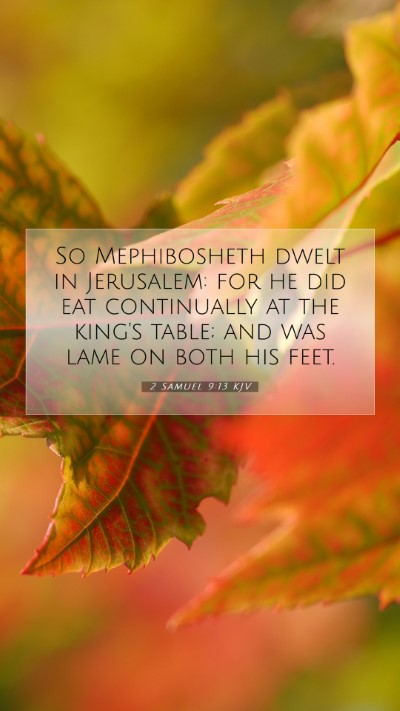Old Testament
Genesis Exodus Leviticus Numbers Deuteronomy Joshua Judges Ruth 1 Samuel 2 Samuel 1 Kings 2 Kings 1 Chronicles 2 Chronicles Ezra Nehemiah Esther Job Psalms Proverbs Ecclesiastes Song of Solomon Isaiah Jeremiah Lamentations Ezekiel Daniel Hosea Joel Amos Obadiah Jonah Micah Nahum Habakkuk Zephaniah Haggai Zechariah Malachi2 Samuel 9:13 Meaning
What is the meaning of 2 Samuel 9:13?
So Mephibosheth dwelt in Jerusalem: for he did eat continually at the king's table; and was lame on both his feet.
2 Samuel 9:13 Bible Verse Meaning
Bible Verse Explanation: 2 Samuel 9:13
Verse (2 Samuel 9:13): "So Mephibosheth lived in Jerusalem, because he ate always at the king's table. Now he was lame in both his feet."
Overview
This verse encapsulates the profound act of kindness shown by King David towards Mephibosheth, the son of Jonathan, which illustrates themes of grace, restoration, and acceptance in the heart of David’s reign. It not only highlights Mephibosheth's physical condition but also emphasizes his familial connection to King Saul and the promise David made to Jonathan.
Commentary Insights
-
Matthew Henry:
Matthew Henry notes that David’s kindness to Mephibosheth serves as an exemplary model of loyalty and compassion. He emphasizes the importance of fulfilling promises and the grace extended to those who are often undesirable by the standards of society.
-
Albert Barnes:
Albert Barnes explains that Mephibosheth's presence at David's table signifies a restoration of fortune for one who had previously been marginalized due to his disabilities. He highlights the theological implications of being welcomed into the king’s presence, mirroring God’s grace towards humanity.
-
Adam Clarke:
Adam Clarke discusses the physical and spiritual symbolism of Mephibosheth's lameness, suggesting that it represents the fallen state of humanity. His eating at the king’s table denotes fellowship and divine acceptance, indicating that regardless of our shortcomings, we can find grace in God’s presence.
Understanding the Context
This narrative occurs in a pivotal moment during David's reign, highlighting his commitment to Jonathan’s legacy. After a time of turbulence following the death of Saul, David seeks to honor the covenant he made with Jonathan. This reflects a broader biblical theme of redemption and the transformative power of grace.
Key Themes
- Grace and Mercy: The act of inviting Mephibosheth to dine at the king’s table is a clear representation of unmerited favor. David’s kindness reflects God’s grace, which is extended to all who seek it, regardless of their past.
- Restoration: Mephibosheth, despite his physical limitations, is restored to a position of honor and security, delineating God’s ability to transform our circumstances.
- Acceptance: Through this act, David embraces Mephibosheth as family, pointing towards the inclusion and acceptance of all believers into God’s kingdom.
Application for Today
In reflecting upon this verse, believers can draw parallels to their own lives by embodying the principles of kindness and grace. Just as David extended love to Mephibosheth, we are called to reach out to those who might be overlooked or marginalized in our communities.
- Consider how you can offer support and kindness to those in need.
- Reflect on the importance of keeping promises and being trustworthy in relationships.
- Examine your own need for grace and how you can extend that to others.
Related Bible Cross References
- 2 Samuel 4:4 - The background of Mephibosheth's lameness.
- Psalm 68:5 - The Lord as a father to the fatherless.
- Ephesians 2:8-9 - The concept of grace and salvation by faith.
Conclusion
2 Samuel 9:13 serves as a powerful reminder of the transformative impact of mercy and grace. It challenges readers to embrace the call to live out these virtues in their everyday lives, highlighting the significance of being welcomed into God’s presence, just as Mephibosheth was welcomed by David.
Further Study
For those interested in deeper Bible study insights, consider exploring topics such as:
- The significance of covenant in the Old Testament.
- Understanding the nature of God's grace in scripture.
- How to interpret Bible verses within their historical context.


